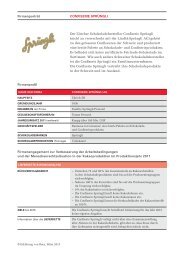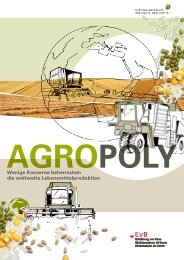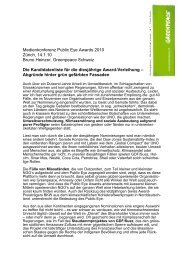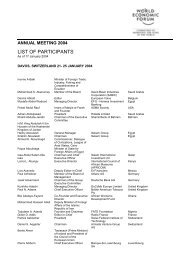Maid in India
Maid in India
Maid in India
You also want an ePaper? Increase the reach of your titles
YUMPU automatically turns print PDFs into web optimized ePapers that Google loves.
<strong>Maid</strong> <strong>in</strong> <strong>India</strong><br />
District<br />
Total number<br />
of factories<br />
Factories with Sumangali<br />
Scheme Practices<br />
Number of women<br />
workers <strong>in</strong> scheme<br />
practices<br />
Tirupur / Sp<strong>in</strong>n<strong>in</strong>g Mills 130 77 20,000<br />
Erode / Sp<strong>in</strong>n<strong>in</strong>g Mills 157 63 22,700<br />
Erode Garment Industry 19 7 6,500<br />
D<strong>in</strong>digul / Sp<strong>in</strong>n<strong>in</strong>g Mills 166 52 28,135<br />
Coimbatore / Annur block* 121 92 21,765<br />
Total 593 291 99,100<br />
* Only the Annur Block <strong>in</strong> Coimbatore was <strong>in</strong>cluded <strong>in</strong> the survey. It is estimated that the number of factories us<strong>in</strong>g<br />
the Sumangali Scheme <strong>in</strong> the whole district of Coimbatore might be three times as high as the number <strong>in</strong>cluded <strong>in</strong><br />
the table.<br />
Apprenticeship scheme/ tra<strong>in</strong><strong>in</strong>g scheme<br />
Under the apprenticeship or tra<strong>in</strong><strong>in</strong>g scheme, workers are employed as ‘apprentices’. These<br />
workers either live <strong>in</strong> the factory hostels or they commute between factory and home. Apprentices<br />
may also be employed under the Sumangali Scheme. Local law allows textile and garment<br />
manufacturers to employ workers as apprentices for a maximum period of three years while <strong>in</strong> the<br />
rest of <strong>India</strong> the apprenticeship period is limited to a maximum of one year. Hir<strong>in</strong>g workers as<br />
apprentices means that the employer can pay these workers an 'apprenticeship wage'.<br />
Furthermore, apprentices are excluded from the protection of most labour laws. The Apprenticeship<br />
Act states the follow<strong>in</strong>g: ‘Any law with respect to labour shall, except for the provisions of Chapters<br />
III, IV and V of the Factories Act 1948 (health, safety and welfare of the apprentice), not apply to or<br />
<strong>in</strong> relation to an apprentice.’ Apprentices can thus be paid lower wages and they enjoy fewer rights<br />
than regular workers.<br />
The field research carried out for this report shows that workers employed under this scheme<br />
cannot be considered as apprentices. Accord<strong>in</strong>g to the Apprenticeship Act, a worker can be<br />
qualified as an apprentice if the employer ma<strong>in</strong>ta<strong>in</strong>s a record of the tra<strong>in</strong><strong>in</strong>g of the apprentice and<br />
issues a certificate of proficiency after the apprentice passes a test at the end of the tra<strong>in</strong><strong>in</strong>g period.<br />
The <strong>in</strong>terviewed workers said that they do not follow any tra<strong>in</strong><strong>in</strong>g or courses nor do they have to do<br />
a test after completion of the tra<strong>in</strong><strong>in</strong>g period. None of the <strong>in</strong>terviewed ex-workers received a<br />
certificate of proficiency.<br />
2.3.2. Labour conditions <strong>in</strong> the Tamil Nadu textile and garment <strong>in</strong>dustry<br />
Contracts/ false promises<br />
In most cases there is no written agreement conta<strong>in</strong><strong>in</strong>g the promises made dur<strong>in</strong>g recruitment.<br />
Moreover, many workers who are recruited under the Sumangali Scheme are under the impression<br />
that the promised lump sum payment is a bonus, while <strong>in</strong> fact the lump sum payment consists of<br />
withheld wages.<br />
Workers often do not receive a contract, leav<strong>in</strong>g them without any proof of what has been<br />
promised. Sometimes workers receive a contract <strong>in</strong> a language that they do not understand.<br />
A 2011 study by a local NGO with the support of KFB Austria showed that among 1638 Sumangali<br />
workers only 60.74% of the workers had signed a contract, and that an overwhelm<strong>in</strong>g majority of<br />
these workers (96.1%) did not receive a copy of the contract. 21<br />
21<br />
KFB Austria, ‘Advocacy Study on the Impact of the Sumangali Scheme on the Adolescent Girls from Rural Areas of<br />
Southern Tamil Nadu’, Tirunelveli, <strong>India</strong>, 2011.<br />
22
















